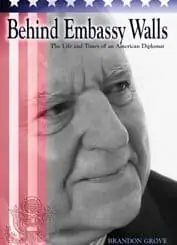Back to Diplomats and Diplomacy
Behind Embassy Walls: The Life and Times of an American Diplomat
 “A solid contribution to recent history with fascinating characterizations of leading diplomatic players.” ––ARTHUR SCHLESINGER, JR.
“A solid contribution to recent history with fascinating characterizations of leading diplomatic players.” ––ARTHUR SCHLESINGER, JR.
Son of an international oilman and a Polish émigré, Grove grew up largely in prewar Europe: in Nazi Germany, Holland, and Spain. He recounts his friendship with William Faulkner during undergraduate days at Bard College, his Navy service during the Korean War, and his 35-year diplomatic career in Africa, Europe, Central America, and the Middle East, under nine presidents and twelve secretaries of state.
Woven into his narrative are observations on the impact of McCarthyism; career vs. political appointees to ambassadorships; the training of ambassadors, for which he was responsible during the first Bush administration; lawyers as diplomats; CIA stations at U.S. embassies; and crisis management in Washington. Grove opened the first U.S. embassy to East Germany in 1974, served as consul general in Jerusalem in the early 1980s during the Lebanon war, and was ambassador to Zaire during Mobutu’s reign. As director of the Foreign Service Institute he coordinated the design and construction of the National Foreign Affairs Training Center. In a concluding chapter he describes the requisites for effective American diplomats today.
Grove voices criticism of the Foreign Service and the State Department, while at the same time revealing the human face of diplomacy. He offers discerning assessments of such notable personalities as Ethel and Robert Kennedy, George Kennan, Chester Bowles, John Kenneth Galbraith, George Ball, Willy Brandt, Omar Torrijos, Teddy Kollek, Philip Habib, Soviet ambassador Piotr Abrasimov, John Sherman Cooper and wife Lorraine, Mobutu Sese Seko, Vernon Walters, Kofi Annan, Richard A. Clarke, Jimmy Carter, Ronald Reagan, and communist diplomats encountered in Berlin and Africa, among many others.
In retirement Brandon Grove serves on leading foreign affairs councils. He has chaired the editorial board of the Foreign Service Journal, authored an essay on Zaire in the Encyclopedia of U.S. Foreign Relations, and taught a course on diplomacy at Hamilton College. In this book, Brandon Grove reveals a fine sense of time and place — and of humor — while contributing throughout to the historical record.
